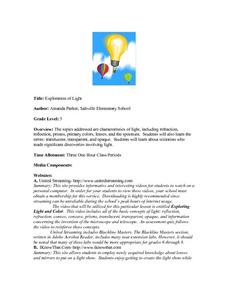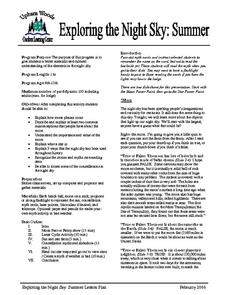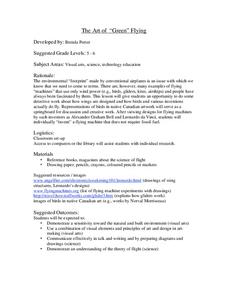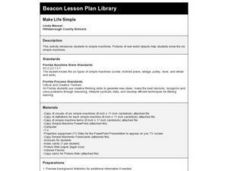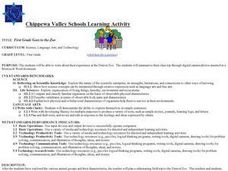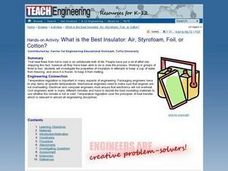Curated OER
Water Microbes and Human Health
Students research the possible sources and human health effects of microbes found in recreational and drinking water. They explore the range of negative outcomes of contact with contaminated recreational and drinking water by creating...
Curated OER
Endangered Species
Students define extinction, name four animals and two plant species that are extinct, list three reasons why animals and plants become extinct, and create ways that would help prevent extinction.
Curated OER
The 400-acre wood
In this forest planning lesson plan, young scholars visit the 400-acre wood website and work in groups to learn about the specific aspects of forest development. Students create, label and color a forest planning map and present...
Curated OER
Trends Forecasting
Students practice trends forecasting to predict the weather. For this forecasting lesson plan, students learn how meteorologists predict the weather by looking at weather trends. They then predict their own forecast, analyze the results,...
Curated OER
Survival of the Fittest Microbes
Students explore the harsh conditions of Spain's Rio Tinto River and research the microbes that nonetheless manage to thrive there. They synthesize their knowledge by creating a reality television show set in the Rio Tinto with microbes...
Curated OER
Physical or Chemical? That Is the Question
Students find examples of physical and chemical changes using the five Web World Wonders camera sites.
Curated OER
Exploration of Light
Fifth graders observe the video, Exploring Light and Color. They access a website to create their own light show. They conduct lab experiments to investigate refraction, reflection,and other light-related topics.
Curated OER
Lessons: Food Web
Students use an interactive web-based food web game to gain familiarity with tropic levels and interactions. They already understand that in an ecosystem there are four basic tropic levels: producers, primary consumers, secondary...
Curated OER
Getting into Hot Water
Young scholars discuss the effect of global warming on bodies of water after reading "An Icy Riddle as Big as Greenland" from The New York Times. Students work in groups to research topics related to global warming and Greenland's...
Curated OER
Exploring the Night Sky: Summer
Students explain how moon phases occur. They describe and explain at least two common misconceptions that people have about the moon. Students explain what a star is. They explain 3 ways that the night sky has been used throughout history.
Curated OER
The Art of "Green" Flying
Students create an airship that doesn't use fossil fuel. In this flying lesson, students research different types of flying machines that only use wind power. They discuss invention designs by Alexander Graham Bell and Leonardo Da Vinci...
Curated OER
Make Life Simple
Young scholars examine six simple machines by looking at pictures of real world objects.
Curated OER
Simple Machines
Students explain how simple machines work and design their own machine. They use the Internet for research.
Curated OER
Classifying Vertebrates
Second graders study animal characteristics and classification. In this animal characteristics and classifications instructional activity, 2nd graders determine how to classify vertebrates which include mammals, reptiles, amphibians,...
Curated OER
Acids and Bases: Together again!
High schoolers identify principles behind acid-base reactions. They predict factors that may affect an acid-base reaction. Students identify questions and concepts that guide scientific investigations.
Curated OER
Volcano Types
Students view a teacher created PowerPoint on the different types of volcanoes and complete a worksheet identifying the different types of volcanoes. They access the Internet to research a specific type of volcano. They create a...
Curated OER
First Grade Goes to the Zoo
First graders summarize their trip to the zoo. In this summarizing lesson plan, 1st graders will study animals that they may see at the zoo including their characteristics and habitats. Once the trip is done, they create a word document...
Curated OER
Create a Greener Place- Adventures in Podcasting
Students create a podcast. In this environment lesson, students learn what a podcast is and why it is used. Students make a podcast about making the world a greener place.
Curated OER
What Do I Wear in the Winter?
Students identify the appropriate clothing to wear in the winter. In this seasonal weather lesson, students discuss what warm and cold weather feels like and what clothing is necessary during the specific seasons. Students explore...
Curated OER
What Influences Reaction Rate?
Students study reaction rates, what determines how fast a reaction happens and how the chemical changes occur. In this reactions lesson students complete a lab where they use Alka-Seltzer to observe reaction rate and create a graph...
Curated OER
What is the Best Insulator: Air, Styrofoam, Foil, or Cotton?
Students investigate the properties of insulators by attempting to keep a cup of water from freezing, and once it is frozen, to keep it from melting. They conduct the experiment, record and analyze the results, and answer discussion...
Curated OER
Aviation
Sixth graders examine the main parts of an airplane and explain their functions. They inquire about a flight simulator. They study a flight plan and what happens when they move the flight controls. They view and keep a logbook.
Curated OER
Analog Forecasting
Students recognize the elements of an analog weather forecast. In this weather forecasting lesson, students use a website and look for trends, persistence and climatology in weather forecasting. Students complete a...
Curated OER
Elders' Weather Forecasting
Learners interview an Elder to determine ways of forecasting the weather. In this weather lesson, students use the information from an interview to make a weather prediction.








